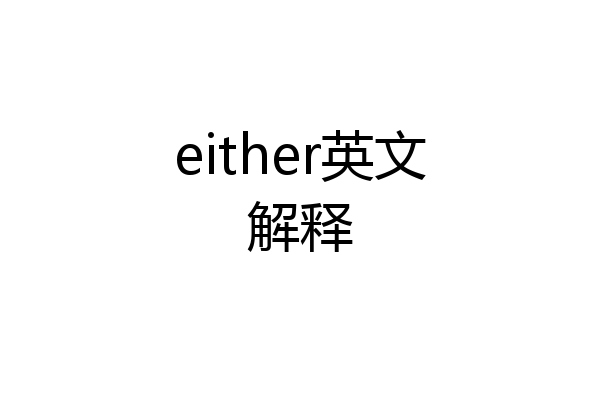
!首席12333
either
1 、CONJ-COORD (表示在两者或多者中择其一)或者,要么
2 、 CONJ-COORD (用于否定句中)两者都(不),既(不)
3 、PRON (两者之中)任意一个
与too的区别
1、too语气较轻,多用于口语,用于肯定句与肯定问法的疑问句,通常位于句末。
2、either用于否定句与否定问法的疑问句,放在句末,之前不加逗号。
扩展资料
also,too,as well,either,likewise
这些词均含“也”之意。
1、also比too正式一些,语气较重,只用于肯定句,一般紧靠动词。
2、too语气较轻,多用于口语,用于肯定句与肯定问法的疑问句,通常位于句末。
3、as well一般不用否定句,通常放在句末,强调时可放在句中。
4、either用于否定句与否定问法的疑问句,放在句末,之前不加逗号。
5、likewise是书面语用词。
6、either ... or ...要么...要么...
7、either of+the+可数名词复数 任何一个
8、反义词 neither


不是我的白云
either的读音:英[ˈaɪðər; ˈiːðər]、美[ˈiːðər,ˈaɪðər]。
释义:
conj. 或者,要么。
adv. 也;而且。
det. (两者之中的)任何一个;(两者之中的)各方;(用于否定句表示两者)都不。
adj. (两者中) 任一的;两者择一的。
pron. (两者中的)任何一个;(两者中的)每个;(用于否定句表示两者)都不。
either造句。
1、I either eat noodles or eat rice.
我午饭要么吃面要么吃饭。
2、Either of these two schemes is feasible.
这两个方案中任意一个都可行。
3、There is no love for him in either marriage.
他的两段婚姻都没有爱情。

注册不太麻烦
1、either,英文单词,连词、副词、限定词、形容词、代词,作连词时意为“或者,要么”,作副词时意为“也;而且”,作限定词时意为“(两者之中的)任何一个;(两者之中的)各方;(用于否定句两者)都不”,作形容词时意为“(两者中)任一的;两者择一的”,作代词时意为“(两者中的)任何一个;(两者中的)每个;(用于否定句表示两者)都不”。2、例句:Yes,youshouldnottrustmeeither.是的,你也不应该信任我。

比福爷爷
either读[ˈaɪðə(r)] 。
either是英文单词,作连词时意为或者,要么。作副词时意为也,而且。作限定词时意为任何一个,(两者之中的)各方,(用于否定句两者)都不。作形容词时意为任一的,两者择一的。作代词时意为(两者中的)任何一个,(两者中的)每个,(用于否定句表示两者)都不。
例句:
1、You may take either of the two.
你可以从两个中间挑任何一个。
2、I don't think either of them are at home.
我想他们中任何一个都不在家。
3、In this business, either you've got it or you haven't.
在这件事上,你不是成功了就是失败了。

小月半月月
一,单独使用时either 也,放在句末,用于否定句If you do not go,I shall not either.倘若你不去,我也不去 I have not seen him either.我也没有看见过他。 I haven‘t been there yet,either.我也没有去过那儿。 too 也,放在句末,用于肯定句I went there, too.我也到那儿去的。Mother was angry too.母亲也发怒了。 also 也,比too正式,放在动词前He also asked to go.他也要求去.I also went. 我也去的.He came also. 他也来的。练习1. You are reading English, I am _____reading English.2. They are at school. They are students,______.3.Jim doesn’t know Japanese, and his brother doesn’t know Japanese, ______.答案:also, too, either二,与其它词组成词组使用时either的另外一种用法,与of和or连用即:(1)either of两者其一,Either of us speaks English. (注意“speaks“)注意:其后一般跟单数,注意与both of(后跟复数)的区别There are trees on either side of the street. 街的两边(每一边)绿树成荫。 There are trees on both sides of the street. 街的两边绿树成荫(2)either ... or...或者……或者……,不是……就是……采用就近原则问题如:When the girl is happy, she either sings or dances. 那个女孩高兴时,不是唱就是跳。(此句中either...or...连接两个动词,因为主语是单数第三人称,谓语动词要用其相应的形式。) Either you or I am going there tomorrow. 明天要么你去那里,要么我去那里。(连接两个主语时,其谓语动词应与最近的一个主语在人称和数上保持一致,这就是我们通常说的“就近原则”。)Are either you or I going there tomorrow? 明天是你还是我去那里? (当either最接近的词语改为you时,助动词是are,就近原则)
优质英语培训问答知识库